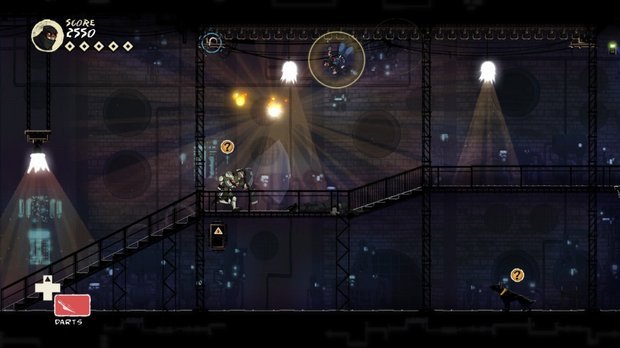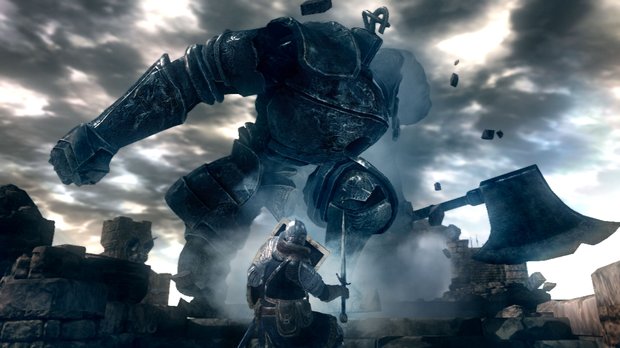Why do we love the games that hate us?
Mark of the Ninja strikes an impressive balance between challenge and reward, but it's certainly not the only game in recent memory to do so. XCOM: Enemy Unknown, Super Meat Boy, Dark Souls (and Demon's Souls before it)--these are all commonly used as examples of games that are difficult but fair. We often joke that they're made for masochists as a result of their extreme challenge. But difficulty in and of itself isn't all that appealing, and will yield only frustration if handled poorly.

In a recent interview with Dark Souls producer Daisuke Uchiyama, he describes difficulty as a vehicle through which players obtain a sense of achievement. "We often ask ourselves: Why do people continue to play, continue to torture themselves, when playing this difficult game? The underlying concept when we were first developing [Dark Souls] was not to make a difficult game, but to provide a sense of achievement, a sense of accomplishment."
The time I spent playing Dark Souls for review in 2011 remains one of the greatest experiences I've ever had with a video game. I had no guides to rely on, no form of assistance. I was forced to explore that intimidating world, to experiment, to employ the skills I'd developed to succeed--and I was punished when I failed to play smart. That punishment was always fair, and it made me appreciate my triumphs even more.

"Jane McGonigal talks about the concept of 'fiero' in her book Reality is Broken," DeAngelis says. "Fiero is an immense sense of pride a player feels when triumphing over adversity, and it’s one of the most powerful emotions an interactive experience can provide. But fiero is absent if there aren’t real odds to overcome. I can’t remember her exact words in the book, but there have been actual neuroscientific studies analyzing the brain concluding that fiero is one of the most intense rushes human beings can experience; you know, those moments where you throw your hands over your head in exultation because you just won a championship, or solved a seemingly impossible problem. So scientifically, challenging games are rewarding because they trigger some of the most powerful, genuine emotions in a player."
Now we're heading into dangerous territory. Publishers fear challenging games won't sell, so they don't make them. Thus we end up facing a barrage of "safe" games--so many of them that they end up opening our eyes to their very safeness, and we become unimpressed. Look at the reception of Medal of Honor: Warfighter. In 2006, people would've gone crazy over that game. Now? Many shrugged so hard they damn near fell off the plateau of apathy. What does that say about the gaming market? Are "hard" games making a comeback? Or are we simply less inclined to blindly fall in love with pretty pictures and fancy lighting effects?
Yu argues that challenging games aren't making a resurgence--they've just been drowned out by the explosion of "casual" games in recent years. "I don't just mean mobile and social games, but big budget games as well. There's a huge mainstream audience now and developers are afraid of scaring them off by making games that are too hard. Now that it's plateaued a little bit, players are rediscovering the joys of tough games."

I desire games with more substance. I crave interactive experiences with consequences. I get excited at the thought of justified failure--I don't care if I lose a game of XCOM eight hours in. If I do, it's because I messed up. That's not to say I don't pick up my Mass Effects, Halos, or Uncharteds from time to time. I still enjoy my shelf lined with Call of Dutys. But there's a special place now for those few games that linger in my mind long after my consoles are powered down. Those are the ones that always surface whenever I think about my most potent gaming memories. And that's pretty damn refreshing.
Weekly digests, tales from the communities you love, and more
You know that kid at parties who talks too much? Drink in hand, way too enthusiastic, ponderously well-educated in topics no one in their right mind should know about? Loud? Well, that kid’s occasionally us. GR Editorials is a semi-regular feature where we share our informed insights on the news at hand. Sharp, funny, and finger-on-the-pulse, it’s the information you need to know even when you don’t know you need it.

Ryan was once the Executive Editor of GamesRadar, before moving into the world of games development. He worked as a Brand Manager at EA, and then at Bethesda Softworks, before moving to 2K. He briefly went back to EA and is now the Director of Global Marketing Strategy at 2K.


